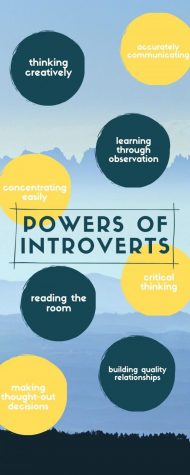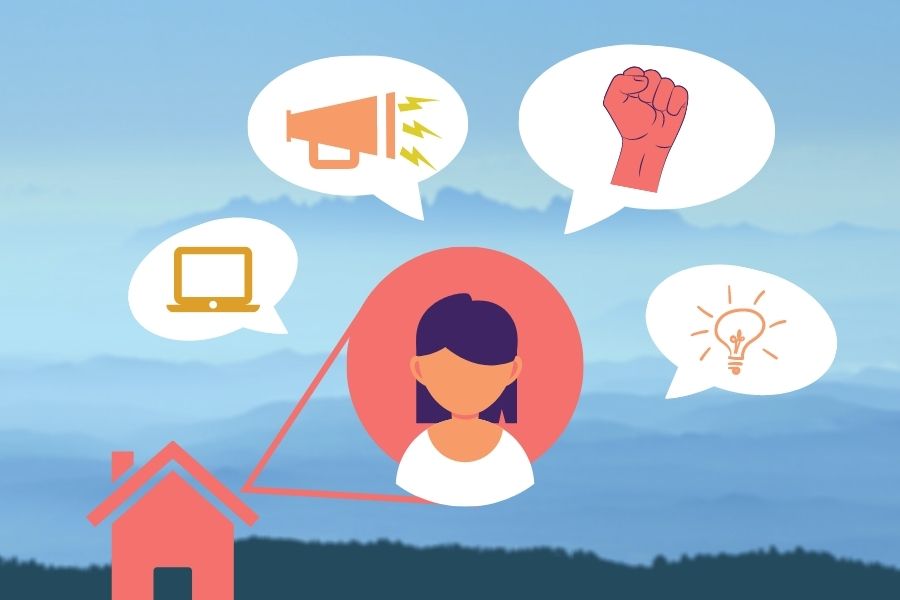You say quarantine made you understand the value of a little ‘me time,’ appreciate a little quiet, become a little more introverted. Amazing job, I’m so proud of you. But you did not change, your environment did. Our extrovert-centric society suddenly ceased to function, giving you the room to discover a truth that had always been a part of you: you are an introvert, and it’s time you learned that your strengths can give you a unique advantage.
Stay-at-home orders created an effective roadblock against regular social happenings, which all cater to extroverts. In school, our desks are arranged into tables and we participate in fishbowl discussions. In college, we are urged to join Greek life and make friends with dozens of people. Even at work, more and more companies are moving toward collaborative work environment precedents set by Google, Pixar and the like. Now that the environment has changed, introverts can play to their own strengths instead of struggling to fit in with previous social norms.
Introverts are blossoming in virtual discussions with amazing ideas, even though we might have never heard them speak up in class before. Instead of feeling pressured to come up with insightful comments on the spot in class-wide discussions, introverts now have space to formulate carefully thought out responses. The more one-directional learning style allows introverts reprieve from teachers randomly calling on them. The slower pace of life creates time for lots of self reflection while on long walks with your dog.
Most introverts don’t aim to leave society entirely and rhapsodize about nature in the woods (I’m looking at you, Henry David Thoreau). They do like collaboration and can actually contribute in ways extroverts might not be able to. Authors like Susan Cain, Beth Buelow and Jennifer Kahnweiler have researched and written entire books on the amazing contributions introverts specifically can make to companies, teams, media and more.
In both her book and her TedTalk, Cain details how introverts can and will further our society, and that it is well worth our time to stop and listen to them. She flows through the numerous qualities of introverts: having deeper connections, being observant, staying calm in crises and being able to map out and understand various elements of a complex problem. A quiet person can have amazing insight to share if given the chance.

There have been many successful introverts. Take Bill Gates: if you watch just a bit of the Netflix docuseries “Inside Bill’s Brain: Decoding Bill Gates,” his thoughts, habits and other actions tend to demonstrate traits characteristic of introverts (see infographic). There is one stickler, though. Most people consider shyness a telltale sign of introvertedness, but Gates seems to have no problem speaking his mind. Is he still an introvert? The answer is yes.
Most people exhibit a combination of both introverted and extroverted traits. You can fall anywhere on the spectrum from introvert to extrovert, or even be an ambivert if you feel like you fall dead center. Introverted and extroverted traits complement each other. Gates praises collaboration between each side, attributing success to taking advantage of each personality type’s benefits.
For most of us who think quarantine has turned us into introverts who find ourselves needing extra time to recoup after Zoom class or preferring a solo walk around the neighborhood, we’ve most likely been closeted ambiverts. But instead of pushing these feelings aside whenever quarantine lifts, take advantage of the positive impact you can have on the world by staying true to your introverted side as well. It’s okay to be quiet.



![Sophomore Maryem Hidic signs up for an academic lab through Infinite Campus, a grading and scheduling software. Some students enjoyed selecting their responsive schedule in a method that was used school-wide last year. “I think it's more inconvenient now, because I can't change [my classes] the day of, if I have a big test coming and I forget about it, I can't change [my class],” sophomore Alisha Singh said.](https://pwestpathfinder.com/wp-content/uploads/2025/10/DSC_0012-1200x801.jpg)
![Senior Dhiya Prasanna examines a bottle of Tylenol. Prasanna has observed data in science labs and in real life. “[I] advise the public not to just look or search for information that supports your argument, but search for information that doesn't support it,” Prasanna said.](https://pwestpathfinder.com/wp-content/uploads/2025/10/DSC_0073-2-1200x800.jpg)
![Junior Fiona Dye lifts weights in Strength and Conditioning. Now that the Trump administration has instituted policies such as AI deregulation, tariffs and university funding freezes, women may have to work twice as hard to get half as far. "[Trump] wants America to be more divided; he wants to inspire hatred in people,” feminist club member and junior Clara Lazarini said.](https://pwestpathfinder.com/wp-content/uploads/2025/05/Flag.png)
![As the Trump administration cracks down on immigration, it scapegoats many immigrants for the United States’ plights, precipitating a possible genocide. Sophomore Annabella Whiteley moved from the United Kingdom when she was eight. “It’s pretty scary because I’m on a visa. When my visa expires next year, I’m not sure what’s going to happen, especially with [immigration] policies up in the air, so it is a concern for my family,” Whiteley said.](https://pwestpathfinder.com/wp-content/uploads/2025/05/DSC_0077-7copy.jpg)
![Shifting global trade, President Donald Trump’s tariffs are raising concerns about economic stability for the U.S. and other countries alike. “[The tariffs are] going to pose a distinct challenge to the U.S. economy and a challenge to the global economy on the whole because it's going to greatly upset who trades with who and where resources and products are going to come from,” social studies teacher Melvin Trotier said.](https://pwestpathfinder.com/wp-content/uploads/2025/05/MDB_3456-1200x800.jpg)



![Some of the most deadly instances of gun violence have occurred in schools, communities and other ‘safe spaces’ for students. These uncontrolled settings give way to the need for gun regulation, including background and mental health checks. “Gun control comes about with more laws, but there are a lot of guns out there that people could obtain illegally. What is a solution that would get the illegal guns off the street? We have yet to find [one],” social studies teacher Nancy Sachtlaben said.](https://pwestpathfinder.com/wp-content/uploads/2025/01/DSC_5122-1200x800.jpg)

